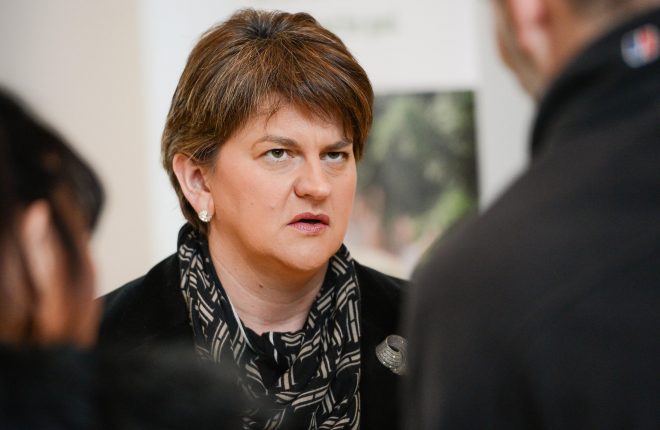
First Minister Arlene Foster RMG78
WHATEVER about the rest of the UK, it is hard to see how leaving the EU can be anything other than very damaging for the North’s economy, and nowhere more so than in border areas like Fermanagh
Yes, we still have little idea how things will pan out in terms of what new deals will be struck between the EU and post-Brexit Britain, but here’s what we do know:
• Farmers rely on EU payments to an inordinate amount – perhaps as much as 90 per cent of their income comes from Brussels. Assurances from the leave campaign that the UK government will keep up this level of subvention simply don’t stand up to any scrutiny. It won’t happen.
• Border controls of some sort, and especially on freight, are inevitable. For anyone doing business across the border – and that includes almost every business you can think of in Fermanagh – that’s more paperwork, more delays, more cost and more reason for customers in the South to bring their business elsewhere.
• The decline in sterling may give Fermanagh businesses, including shops and those who export to the EU some short term gain, but the euro is also going to suffer from Brexit so don’t count on this having any long-term benefits.
• Attracting inward investment is about to get a whole lot more difficult. Ask anybody thinking of setting up a new business whether they should go north or south. After all the uncertainty of the past couple of days it’s a no brainer and Stormont’s fixation with reducing corporate tax now looks even more like the irrelevancy that it always was.
• The border region has benefited from EU structural funding and ‘peace money’ on a massive scale – and not just in terms of infrastructure. The community sector, which provides a range of vital services, as well as being one of our biggest employers, has been hugely reliant on EU funding. Think of all the community centres, playgroups and programmes helping older people, young people, the unemployed, etc. that would never have got off the ground without EU money. Will the next Tory government pick up the tab the way they will with the farmers? Unlikely, I’d say.
• And here’s where it’s going to really hurt: the UK economy is going to take a massive hit no matter what. Another recession looks very possible and of one thing you can be certain: if there’s less to go around, places on the periphery that are most reliant on benefits and public sector employment, places like Fermanagh, will be worst affected.
And just to add to your post-Brexit woes, you can expect inflation to go up as imports become dearer – and that, of course, includes road fuel which is proportionately a bigger slice of family outlays in rural areas.
When you look at just how damaging Brexit could be for this part of the world – and there have been no coherent arguments made that suggest otherwise – it raises serious questions about the part that our political leaders have played in this mess.
First Minister Arlene Foster has a serious amount of explaining to do. This is the same First Minister who has been banging on about inward investment and making the North more competitive. When virtually anyone and everyone in business here has been warning of the consequences of Brexit for our fragile economy, the onus was on Ms Foster to make a convincing case for just how leaving the EU was a good thing. In the absence of this, many of us have drawn the conclusion that she and her party were quite happy to put political dogma before the good of the region she presides over.
Not that the other government party, Sinn Fein, have emerged with much credit either. Sinn Fein’s support for Remain was about as half-hearted as Jeremy Corbyn’s and Remainers are now wondering did SF, like the DUP, put their own narrow party interests before the interests of the people they represent.
Within minutes of the referendum result Sinn Fein were just a little too fast out of the traps calling for a poll on Irish unity and there were plenty of cynics wondering why, Martina Anderson aside, they had heard so little from Sinn Fein over the course of the campaign.
The argument goes that Brexit would suit Sinn Fein very nicely if it made the case for a united Ireland stronger. All very well, but if the people who they claim to represent are going to suffer as a result, we have a problem.
We in the North now need to make the best of a bad job. The big winner in all this has to be the Republic. It may be adversely affected in the short term by the turmoil gripping its biggest trading partner, but as the only native English-speaking state left in the EU and a long-standing reputation as a prime location for foreign investment it is well placed to cash in.
In the financial services sector alone, an estimated 50,000 jobs are set to relocate fromthe City of London; expect Dublin to get a fair share of them. Brexit has the potential to transform the economy of the Republic and if we are not to end up the basket case of the British Isles we need to find a way to share in its good fortune.
Talk of a poll on Irish unity is at this stage only a distraction. Equally, the idea that hardening the border can possibly be good for the North is patent nonsense. At this criticial stage we need our elected representatives to act with honesty and integrity. And we now need them to do what they should have been doing all along – listen to the people and act in their interest.
Posted: 1:00 pm June 28, 2016








